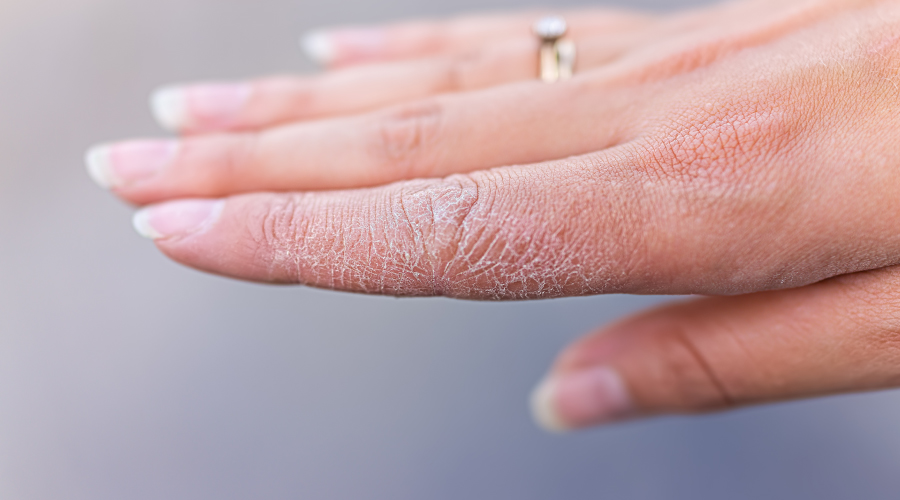

Drying and peeling of the outermost layer of your skin or epidermis amounts to scaling skin. When dead skin cells accumulate on your skin, it gives a scaly appearance. Skin scales can either be very thin or thick.
Scaling skin on visible parts of your body, like the face, hands, and feet, can look awkward. These scales can sometimes be itchy and swollen. Identifying the cause and seeking appropriate treatment is crucial to avoid escalating this skin condition.
Scaling Skin Causes
Scaling skin causes are numerous. Different conditions, as described below, lead to scaling skin:
1. Actinic Keratosis
This skin condition is generally age-related. It appears on body parts exposed to the sun, like hands, arms, face, and scalp. As you age, you may notice rough, scaly spots, normally referred to as age spots. This is caused due to prolonged exposure to the sun. These spots form when you have actinic keratosis, a very common skin condition.
With the abnormal growth of keratinocytes, the skin cells form scaly, discoloured spots, which is when actinic keratosis occurs. The patches can appear in various colours. They can be tan, brown, grey, or pink. The spots should be monitored and you should seek timely treatment. If left untreated, it could progress to squamous cell carcinoma in some cases, though the chances are remote.
2. Athlete’s Foot
Athlete’s Foot is a contagious fungal infection that affects the skin on your feet. It can spread to toenails and hands. Since athletes are more prone to this infection, it is called athlete’s foot. The growth of tinea fungus on your feet is the cause behind this condition. You can get affected by touching a contaminated surface or when you come in contact with someone having a skin condition. The fungus normally grows in moist environments. If you are diabetic or your immune response is weak, you should get immediate treatment if you suspect this skin condition.
3. Allergic Reactions
Rashes are an outcome of allergic reactions or immune responses to allergens on your skin. Soon after you come in contact with any substance you are allergic to, like pollen, mould, mites, etc., rashes appear on the skin. Severe allergic reactions can lead to inflammation as well as breathing issues and have to be attended to immediately.
4. Allergic Eczema
When you come in contact with an allergen, your skin will develop an itchy and scaly rash. The reaction occurs hours after you come in contact with the substance. The rashes generally appear on the forearms and hands and seem like a burn. Sometimes, it may manifest as weeping blisters or blisters that become crusty.
5. Psoriasis
Psoriasis normally affects your skin. There will be scaly rashes on your skin that can be painful and itchy. The colour of the rashes caused by psoriasis depends on your skin tone. It will be pink or red with silvery-white scales if your skin tone is fair or light. The colour will be salmon with silvery-white scales if you have a medium skin tone. If you have a darker skin tone, the colour of the rashes will be reddish or violet-brown with light or greyish colour plaques.
Scaling Skin Treatment
The scaling skin treatment depends on the severity, cause and nature of the scaling skin. If allergens trigger it, you will have to keep away from the allergens to prevent the scaling. If you are not able to identify what triggers the skin condition, you might have to see a dermatologist for evaluation and to confirm what the triggering factor is.
Most of the time, a topical cream will help manage scaling skin. Oral medications may be required if the condition is severe. Depending on the diagnosis, you might have to consult a dermatologist for appropriate treatment.
You might need emergency medical attention if the scaly skin is accompanied by symptoms like breathing issues, severe weakness, swelling, hives, sudden and severe blistering, high fever, etc.
Conclusion
Scaly skin can be the outcome of an immune response to allergens or due to exposure to the sun. It normally appears on visible parts of your body like the face, scalp, arms, and hands. While mild conditions can be treated with topical creams or by keeping away from allergens, severe conditions may require oral medication. Seek immediate medical attention if the scaling is accompanied by symptoms like high fever, nausea, weakness, swelling, etc.





good to know about how to prevent scaling skin on visible part of human body